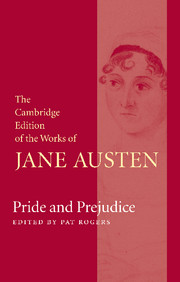Book contents
- Frontmatter
- Contents
- General Editor’s Preface
- Acknowledgements
- Chronology
- Introduction
- Note on the Text
- Pride and Prejudice
- Pride and Prejudice: Volume I
- Pride and Prejudice: Volume II
- Pride and Prejudice: Volume III
- Corrections and Emendations to 1813 text
- Appendix 1 Thomas Egerton and the Publication History
- Appendix 2 Legal and Military Background
- Appendix 3 Pemberley and its Models
- Appendix 4 Note on the second and third editions of Pride and Prejudice
- Abbreviations
- Explanatory Notes
Chapter 23
Published online by Cambridge University Press: 19 December 2020
- Frontmatter
- Contents
- General Editor’s Preface
- Acknowledgements
- Chronology
- Introduction
- Note on the Text
- Pride and Prejudice
- Pride and Prejudice: Volume I
- Pride and Prejudice: Volume II
- Pride and Prejudice: Volume III
- Corrections and Emendations to 1813 text
- Appendix 1 Thomas Egerton and the Publication History
- Appendix 2 Legal and Military Background
- Appendix 3 Pemberley and its Models
- Appendix 4 Note on the second and third editions of Pride and Prejudice
- Abbreviations
- Explanatory Notes
Summary
ELIZABETH was sitting with her mother and sisters, reflecting on what she had heard, and doubting whether she were authorised to mention it, when Sir William Lucas himself appeared, sent by his daughter to announce her engagement to the family. With many compliments to them, and much self-gratulation on the prospect of a connection between the houses, he unfolded the matter,—to an audience not merely wondering, but incredulous; for Mrs. Bennet, with more perseverance than politeness, protested he must be entirely mistaken, and Lydia, always unguarded and often uncivil, boisterously exclaimed,
“Good Lord! Sir William, how can you tell such a story?— Do not you know that Mr. Collins wants to marry Lizzy?”
Nothing less than the complaisance1 of a courtier could have borne without anger such treatment; but Sir William’s good breeding carried him through it all; and though he begged leave to be positive as to the truth of his information, he listened to all their impertinence with the most forbearing courtesy.
Elizabeth, feeling it incumbent on her to relieve him from so unpleasant a situation, now put herself forward to confirm his account, by mentioning her prior knowledge of it from Charlotte herself; and endeavoured to put a stop to the exclamations of her mother and sisters, by the earnestness of her congratulations to Sir William, in which she was readily joined by Jane, and by making a variety of remarks on the happiness that might be expected from the match, the excellent character of Mr. Collins, and the convenient distance of Hunsford from London.
Mrs. Bennet was in fact too much overpowered to say a great deal while Sir William remained; but no sooner had he left them than her feelings found a rapid vent. In the first place, she persisted in disbelieving the whole of the matter; secondly, she was very sure that Mr. Collins had been taken in; thirdly, she trusted that they would never be happy together; and fourthly, that the match might be broken off. Two inferences, however, were plainly deduced from the whole; one, that Elizabeth was the real cause of all the mischief;
- Type
- Chapter
- Information
- Pride and Prejudice , pp. 142 - 148Publisher: Cambridge University PressPrint publication year: 2006

